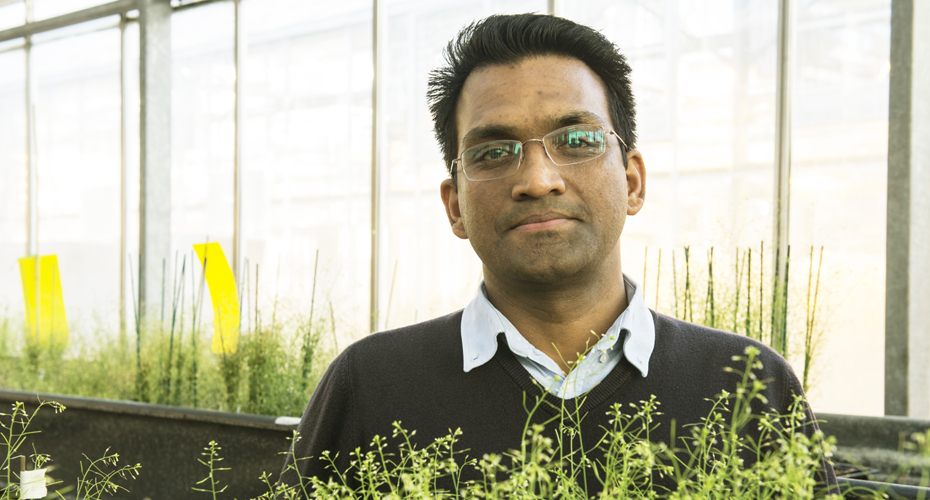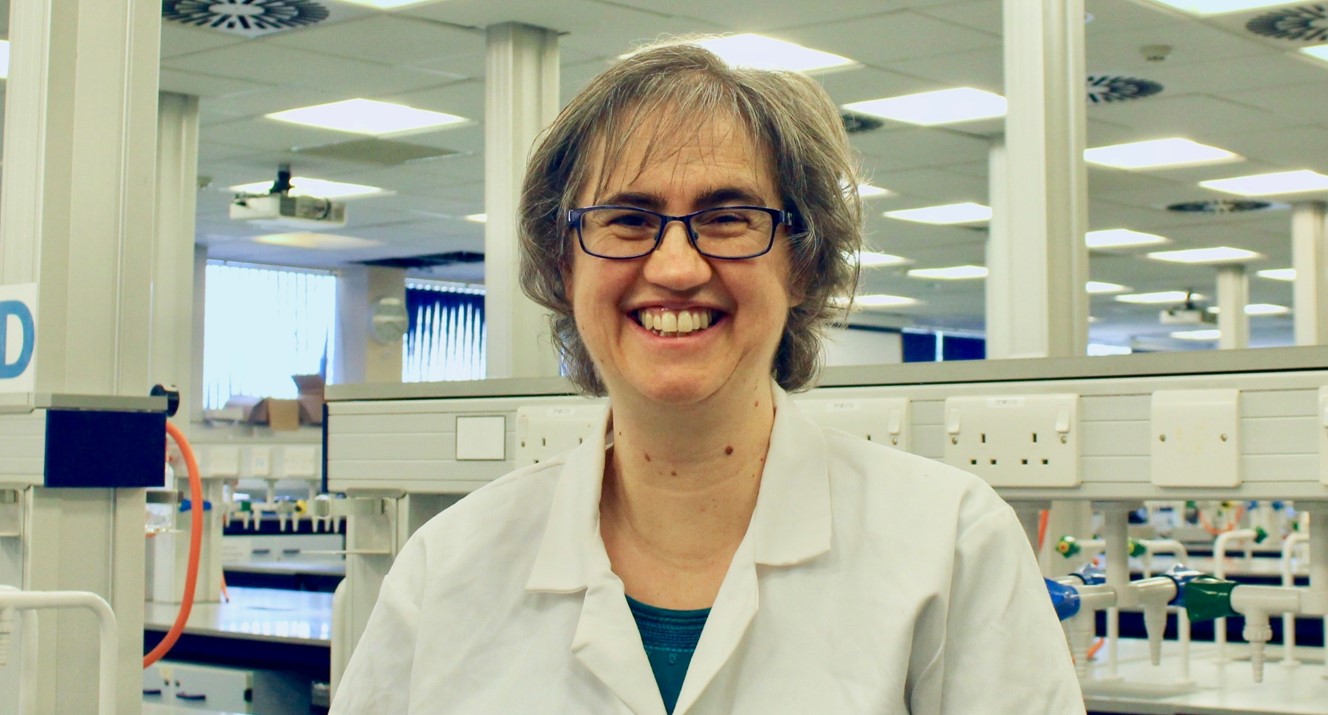Masters applications for 2023 entry are now closed.
Applications for September 2024 will open on Monday 25 September. Applications are now open for programmes with a January 2024 start. View our programmes »
| UCAS code |
1234 |
| Duration |
1 year full time
2 years part time |
| Entry year |
2024 |
| Campus |
Streatham Campus
|
| Discipline |
Biosciences
|
| Contact |
|
Overview
- Undertake a substantial research project working within one of our world-leading research groups inside one of the UK's leading Biosciences departments, ranked 6th in the UK for research power (REF 2021)
- Opportunity to tailor your degree to your career ambitions by choosing one of our seven specialist pathways, including Animal Biology, Microbiology and Infectious Disease, and Frontiers in Plant Science
- Boost your employability with advanced laboratory skills and data processing training
- Gain access to world-leading research facilities including the Aquatic Resources Centre, Bioimaging Centre, Exeter Centre for Cytomics and the Exeter Sequencing Facility
Top 20 in the UK for world-leading research in Biological Sciences
Opportunity to specialise with a choice of pathways
Advance laboratory skills with specialist techniques training
Substantial research project within one of our world-leading research groups
Entry requirements
Minimum 2:1 in a relevant science subject.
Relevant subjects include: Biological Sciences, Cell Biology, Ecology, Ecology and Conservation, Evolutionary Biology, Genetics, Marine Biology, Molecular Biology, Microbiology, Plant Science, Zoology.
Entry requirements for international students
English language requirements
International students need to show they have the required level of English language to study this course. The required test scores for this course fall under Profile B2. Please visit our English language requirements page to view the required test scores and equivalencies from your country.
The Masters programme at Exeter allows you to specialise in an area of Biology that you are most interested in and gives you a fantastic opportunity to undertake research in one of our world-leading research laboratories.
Dr Alison Hill
Programme Director and Senior Lecturer
Course content
Our MSc in Advanced Biological Sciences degree allows you to study a broad base of Biological Sciences, or specialise in one of seven specialist areas (Animal Biology, Bioinformatics, Ecotoxicology, Frontiers in Plant Science, Microbiology and Infectious Disease, Molecular and Cellular Biology, or Sustainable Aquaculture).
Throughout this research-intensive Masters, you will be immersed in a world-leading research environment and trained in the skills required to analyse and address major biological challenges of our time.
Knowledge and skills learned during core modules will enable you to develop your research project, which will be supervised within one of our world-leading research groups, determined by your research project focus.
The optional modules available provide access to a breadth of biosciences topics, which will allow you to tailor your studies to your particular interests and career goals.
Our Advanced Laboratory Skills module provides training in both practical and data processing skills, with advanced laboratory experiments carried out in small groups to prepare you for your independent research project with one of our research groups.
The modules we outline here provide examples of what you can expect to learn on this degree course based on recent academic teaching. The precise modules available to you in future years may vary depending on staff availability and research interests, new topics of study, timetabling and student demand.
During your MSc you can, if you wish, choose to specialise in one of seven specialist pathways:
- Animal Biology
- Bioinformatics
- Ecotoxicology
- Frontiers in Plant Science
- Microbiology and Infectious Disease
- Molecular and Cellular Biology
- Sustainable Aquaculture
You will receive advice about the specialisms once you're at Exeter so you don’t need to make any decisions in advance.
Specialist modules
To be awarded a bracketed specialism on the MSc, at least 45 credits should be selected from the specialist modules grouped below. Your research project (module BIOM560) must also be relevant to the specialist field.
You may take optional modules as long as any necessary prerequisites have been satisfied, where the timetable allows, and if you have not already taken the module in question or an equivalent module.
*You cannot choose this module if you have already taken the undergraduate version.
MSc Advanced Biological Sciences (Animal Biology)
| Code |
Module title |
Credits |
Compulsory |
| BIOM551 |
Biology of Marine Vertebrates (variant of BIO3098)* |
15 |
No |
| BIOM553 |
Current Issues in Marine Biology (variant of BIO3083)* |
15 |
No |
| BIOM554 |
Advanced Applications of Physiology |
15 |
No |
| BIOM4043 |
Rewilding the UK |
30 |
No |
| PSYM205 |
Advances and Methods in Animal Behaviour |
30 |
No |
| PSYM213 |
Current Research Issues in Animal Behaviour |
15 |
No |
MSc Advanced Biological Sciences (Bioinformatics)
| Code |
Module title |
Credits |
Compulsory |
| BIOM516 |
Bioinformatics (variant of BIO3092)* |
15 |
Yes |
| BIOM567 |
Applications of Genomics in Infectious Disease |
15 |
Yes |
| CSC4007 |
Medical Genomics |
15 |
No |
| CSC4005 |
Pharmacogenomics |
15 |
No |
| HPDM041 |
Bioinformatics, Interpretation and Data Quality Assurance in Genome Analysis |
15 |
No |
| NSCM005 |
Mathematical Modelling in Biology and Medicine |
15 |
No |
MSc Advanced Biological Sciences (Ecotoxicology)
| Code |
Module title |
Credits |
Compulsory |
| BIOM568 |
Blue Planet |
15 |
Yes |
| BIOM544 |
Ecotoxicology (variant of BIO3067)* |
15 |
Yes |
| BIOM543 |
Ecology of Environmental Change (variant of BIO3037)* |
15 |
No |
| BIOM554 |
Advanced Applications of Physiology |
15 |
No |
| BIOM4043 |
Rewilding the UK |
30 |
No |
MSc Advanced Biological Sciences (Frontiers in Plant Science)
| Code |
Module title |
Credits |
Compulsory |
| BIOM545 |
Frontiers in Plant Biology (variant of BIO3046)* |
15 |
Yes |
| BIOM546 |
Living in a Microbial World (variant of BIO3097)* |
15 |
Yes |
| GEOM149 |
Green Planet |
15 |
Yes |
MSc Advanced Biological Sciences (Microbiology and Infectious Disease)
| Code |
Module title |
Credits |
Compulsory |
| BIOM525 |
Molecular Basis of Infection (variant of BIO3079)* |
15 |
No |
| BIOM515 |
Cellular Basis of Immunity (variant of BIO3078)* |
15 |
No |
| BIOM534 |
Medical Mycology |
15 |
No |
| BIOM567 |
Applications of Genomics in Infectious Disease |
15 |
No |
MSc Advanced Biological Sciences (Molecular and Cellular Biology)
| Code |
Module title |
Credits |
Compulsory |
| BIOM525 |
Molecular Basis of Infection (variant of BIO3079)* |
15 |
No |
| BIOM515 |
Cellular Basis of Immunity (variant of BIO3078)* |
15 |
No |
| BIOM547 |
Frontiers in Molecular Cell Biology (variant of BIO3077)* |
15 |
No |
| BIOM548 |
Cell Biology of Disease (variant of BIO3086)* |
15 |
No |
| NSCM009 |
Bioimaging |
15 |
No |
MSc Advanced Biological Sciences (Sustainable Aquaculture)
| Code |
Module title |
Credits |
Compulsory |
| BIOM568 |
Blue Planet |
15 |
Yes |
| BIOM551 |
Biology of Marine Vertebrates (variant of BIO3098)* |
15 |
No |
| BIOM553 |
Current Issues in Marine Biology (variant of BIO3083)* |
15 |
No |
| BIOM554 |
Advanced Applications of Physiology |
15 |
No |
*You cannot choose this module if you have already taken the undergraduate version.
Fees
2024/25 entry
UK fees per year:
£14,300 full-time; £7,150 part-time
International fees per year:
£29,700 full-time; £14,850 part-time
Scholarships
We invest heavily in scholarships for talented prospective Masters students. This includes over £5 million in scholarships for international students, such as our Global Excellence Scholarships*.
For more information on scholarships, please visit our scholarships and bursaries page.
*Selected programmes only. Please see the Terms and Conditions for each scheme for further details.
The ability to specialise the degree into one of seven different specialisations (or none) really allows students to tailor this programme to their own ambitions and career aspirations.
Dr Rose Murray
External examiner (University of Bristol)
The suite of programmes naturally builds on our internationally-leading undergraduate degrees, providing a rich and focused research-led experience. It works both ways - a fantastic opportunity for students to enhance their specialist training, while welcoming a new cohort of enthusiastic, budding scientists into our Departmental community.
Professor James Wakefield
Head of Biosciences
Teaching and research
How will I learn?
- Lectures
- Seminars
- Laboratory work
- Group discussion
- Independent study
- Research project
The programme consists of core modules that provide you with a theoretical and applied learning framework for directed student-centred learning where you’ll develop in-demand skills of synthesis, critical analysis, and interpretation. You’ll also receive professional skills training tailored to the areas most relevant to your academic and professional development.
Research project
You will carry out your independent supervised research project in one of our world-leading research laboratories. Research projects are individual and can be based on laboratory work, field work or in silico (e.g. bioinformatics).
The research project will give you first-hand experience in many aspects of research work including data generation, analysis, and interpretation as well as science communication in written, poster and oral presentations.
During your research project, you will be supported by your research supervisor and other members of the research group to ensure you produce your best work.
Facilities
Depending on your chosen modules and research project topic, you may have access to the following facilities:
Tutorial support
You will be allocated a personal tutor who is available for advice and support throughout your studies. There is also a postgraduate tutor available to help with further guidance and advice, and our programme director will offer every student a meeting each term to review academic progress.
Assessment
Taught modules are assessed through essay examinations, individual and group-based coursework assignments, oral presentations, in-module tests and reports or essays. A significant proportion of the marks are based on your substantial research project and the associated paper submitted in August.
Read more

Professor Eduarda Santos
Associate Professor in Environmental Biology

Dr Alan Brown
Senior Lecturer in Molecular Microbiology

Professor Vinod Kumar
Associate Professor of Plant Biology

Dr Alison Hill
Programme Director and Senior Lecturer

Professor James Wakefield
Professor of Integrative Cellular Biology and Head of Biosciences
Professor Eduarda Santos
Associate Professor in Environmental Biology
Professor Santos is an environmental biologist investigating reproductive development and function and the susceptibility of these processes to disruption by environmental stressors. Her research focuses on fish and has ranged from investigating the endocrine control of reproduction to addressing the population level effects of chemical exposure for wild fish, using systems biology strategies.
Profile page
Follow Eduarda on Twitter
Dr Alan Brown
Senior Lecturer in Molecular Microbiology
Dr Brown is a molecular microbiologist interested in defining mechanisms of virulence and niche adaptation in pathogenic bacteria, and how these impact on host-microbe interactions during infection. He has a particular interest in bacterial pathogens associated with chronic lung infections, such as those associated with cystic fibrosis patients. By understanding both the epidemiology and virulence of such organisms, we hope to identify ways to optimise the treatment and management of these life-threatening infections.
Profile page
Professor Vinod Kumar
Associate Professor of Plant Biology
Professor Kumar is a biologist interested in the fundamental principles that underpin perception and integration of environmental signals in plants. He is particularly interested in understanding how plants sense temperature and other seasonal cues to coordinate growth, development and immune responses. His current research is seeking to understand the genetic and epigenetic mechanisms of gene regulation in response to the environment, and adaptation of these mechanisms to local and dynamic environments.
Profile page
Vinod's LinkedIn profile
Dr Alison Hill
Programme Director and Senior Lecturer
Dr Hill specialises in secondary metabolism and teaches chemistry and biochemistry. She carries out pedagogical research into incorporating mathematics into the curriculum. Alison is an Exeter Incubator Fellow and Senior Fellow of the HEA. She is the Senior Tutor for the Masters students and is module lead for the Professional Skills module.
Profile page
Alison's LinkedIn profile
Professor James Wakefield
Professor of Integrative Cellular Biology and Head of Biosciences
Professor Wakefield’s research interest has always been that of mitosis and cell division, stimulated by the fundamental beauty of the process as viewed using a fluorescence microscope, and its key role in diseases such as cancer. He wants to understand how these systems organise themselves, and what governs the similarities and differences between them in diverse types of cell, at different stages of development, and during disease. He takes a multi-disciplinary approach, combining proteomics, bioinformatics and quantitative image analysis with qualitative, descriptive cell and developmental biology, and genetics.
Profile page
Follow James on Twitter
Wakefield Lab website
Careers
MSc Advanced Biological Sciences will provide you with a diversity of skills that will equip you for work in a range of sectors.
Skills include:
- Analytical skills
- Applied statistics
- Scientific writing
- Independent learning
- Critical evaluation
- Research technique
- Oral communication
In the Professional Skills module, we have dedicated careers workshops, and sessions on being an Academic Entrepreneur. Visiting speakers from outside the University are incorporated into some of the taught modules to further enhance your employability and you will be encouraged to seek out internships during your time here.
Careers services
Our dedicated careers team at the Career Zone can help guide you through a wealth of information to match your skills and interests to a career that will suit you. Our staff work with regional, national and international employers to develop new work placement, project and graduate opportunities.
Future careers
Graduates are well placed for a research career in industry, or for progression to PhD. You’ll also be competitively placed for work in Government Agencies such as CEFAS and DEFRA.
The programme is designed very well to support students in attainment of the programme ILOs. In particular, the advanced laboratory skills module is innovative and bespoke for this particular cohort, forming an integral part of the focus of the programme.
Dr Rose Murray
External examiner (University of Bristol)
















